Today, April 23, 2016, marks the 400th death anniversary of one of English literature’s greatest writers, a man who had a huge hand in making English what it is today. Though William Shakespeare’s date of birth is unknown, he died on this day, nearly 52 years after he was baptized. In less than half a century, he created a corpus of work that has endured—and continues to spawn adaptations by the dozen in popular culture—ever since.
Considering the number of films that have been based on works by Shakespeare, I thought it appropriate to commemorate the Bard’s death anniversary by reviewing a film based on a Shakespeare play. There are plenty to choose from, of course, but I decided to go for something a little less predictable: a Hindi film. Hindi cinema has been influenced heavily by Shakespeare (all you have to do is look at all those cases of long-lost siblings, women disguised as men, and so on, to see just how much we love Shakespeare), and there have been several adaptations of his plays: Gustakhi Maaf, Angoor, Do Dooni Chaar, Vishal Bhardwaj’s more recent Omkara, Maqbool and Haider.
What those films have in common is that all of them use Shakespeare as an inspiration, and create their own settings, adapted to India, their own twists on plot elements, and so on. You can see the Shakespearean essence, but it’s much diluted.
Not so in in this version. Kishore Sahu, in 1954, produced and directed (not to mention starred in) a version of Hamlet that uses the setting of Shakespeare’s original play. This realm, we are told, is Elsinore. This man is the Prince of Denmark, Hamlet. Each of the characters bears the name Shakespeare gave them, each of them has the same relationships Shakespeare gave his characters; they wear the costumes medieval Europeans would have worn. The only difference is the language: they speak Urdu, not English.
The story is simple enough. It begins on a night on the ramparts of a castle in Denmark. Horatio (Shreenath), the friend of Prince Hamlet, is on the ramparts with two guards when they see an apparition, wearing what looks like a long and translucent white tent over its garments. This seems to be the ghost of the late King, Hamlet’s father, and Horatio is importuning it to speak, when the approaching dawn makes the spook vanish.
The scene now switches to inside the palace. Hamlet’s uncle Claudius (Hiralal), his father’s younger brother, is now not just King, but since he has married Hamlet’s mother, also Hamlet’s stepfather. He has just received news that Fortinbras, a prince of Norway, is planning to attack Denmark. The King orders the sending of a missive to the King of Norway, cautioning him to stop Fortinbras, or else.
The King’s Prime Minister, Polonius (S Nazir), who pretty much takes the cake when it comes to sycophancy, also gives the King the news that Laertes (Polonius’s son), is about to leave for France, where he is studying. The King is approving, wishing Laertes well. He also fawns over his new queen, who seems to enjoy her new husband’s attention.
While all this camaraderie is in progress, the central character of the play, Hamlet (Kishore Sahu), is all angst and misery. He is still grieving over the death of his father, and the fact that his mother has married her former brother-in-law so quickly has only made him feel even more bitter. Hamlet is so disillusioned at what he perceives as the fickleness and infidelity of womankind that he cannot even bring himself to be near his beloved, Ophelia (Mala Sinha, in one of her earliest roles). Ophelia is puzzled and hurt: this was the man who had given her his handkerchief for remembrance, for whom she had sung love songs: why is he so brusque and unloving now?
Ophelia, who is Polonius’s daughter and therefore Laertes’s sister, now must also bid farewell to her brother. As he’s leaving, Laertes warns Ophelia not to have anything to do with Hamlet. He may appear to love her, may make whatever promises, but Ophelia must beware. Hamlet, after all, is the prince, and heir to the throne: he cannot marry whoever he pleases. Ophelia’s love will come to naught.
Amidst all this, Horatio meets Hamlet and tells him about the apparition he had seen on the ramparts of the castle. Horatio is so certain that it was Hamlet’s father’s ghost (and that the ghost would like to communicate with Hamlet) that Hamlet readily agrees to go up on the ramparts and see for himself.
… which he does. The ghost duly appears and summons Hamlet. When they’re alone, just Hamlet and his dead father’s spirit, the ghost reveals why he’s still wandering the earth, restless and unable to find peace. He did not die a natural death; he was murdered. The queen, Hamlet’s mother, laid him down to sleep in the garden, and as soon as he was asleep, his younger brother—now the King—came along and poured poison into his ears, killing him.
Hamlet’s tenuous grip on his senses deserts him. Already grieving for his dead father and agonizing over his mother’s infidelity, he’s now thrown into even further turmoil. His mother did not merely marry (with such unseemly haste) her brother-in-law, it turns out now that the brother-in-law was the man who widowed her, too! Hamlet makes up his mind: he must avenge his father’s slaying.
The King and Queen are unaware, of course, of all that has transpired with Hamlet. They, like everybody else in court, however have seen Hamlet’s grief, which seems to have driven him half-mad. Hamlet needs cheering up, decides the King; there is a company of players newly arrived, and they should be ordered to perform a play. Something light-hearted, and possibly rather rambunctious and bawdy, no doubt.
Polonius, ever-interfering, does send them a little offtrack for a while, because he insists that Hamlet’s madness is a result of lovesickness. As proof, Polonius presents a love letter he has ferreted out from his daughter’s belongings: its words are evidence enough of Hamlet’s love for Ophelia.
Just to make sure, though, Polonius (who shows a startling lack of scruple) decides to listen in on the next conversation between Ophelia and Hamlet. What he sees and hears shatters his hope that he may soon be becoming the father-in-law of the heir to the throne. While Ophelia pleads with Hamlet and weeps, asking him why he rejects her so, Hamlet scorns beauty and says that beauty is always fickle; beauty cannot be trusted. He’s so obscure that Ophelia does not realize whom he’s referring to.
Neither does Polonius, and so neither do the King and Queen. All of them are mystified: why is Hamlet so enraged (or deranged, or both)?
But remember the King’s order to Polonius, to have a play staged? Little does the King know that Hamlet has met the actors beforehand and has made them agree to stage a certain play about a murder—with a few additional dialogues to be supplied by Hamlet himself. The play will reveal all. The horrific crime of the King, the reason behind Hamlet’s madness.
And there is more to come, for Hamlet, in his mad scramble for vengeance, will stop at nothing. This is not just a tale of vengeance, but of self-destruction too, and of a fury that will destroy everything and everyone that comes in its way. Whether intentionally or by accident, whether friend or foe.
What I liked about this film:
The dialogues, by Professor BD Verma and Amanat Hilal. These are very unlike ‘regular’ Hindi film dialogues; they are, as Shakespeare meant them to be, poetry. The metre is there, the cadence is there, and the beauty of Urdu gives it a lovely old-fashioned feel that may have been lost had the language used been khadi boli. Not all the lines try to be perfect translations of what Shakespeare wrote, but they manage, mostly, to do justice to the original, even if they convey only a part of what was meant.
Here’s an example, of what is probably one of the best-known speeches in English literature:
Original: To be or not to be, that is the question:
Whether ’tis nobler in the mind to suffer
The slings and arrows of outrageous fortune,
Or to take arms against a sea of troubles
And by opposing end them. To die—to sleep,
No more; and by a sleep to say we end
The heartache and the thousand natural shocks
That flesh is heir to…
Urdu soliloquy: Zindagi ya maut, kisko apnaaoon?
Zinda rahoon ya mar jaaoon?
Yeh gutthi kaise suljhaaoon?
Is dil ko kaise samjhaaoon?
Zinda hoon magar deed ki lazzat nahin baaki,
Mar jaaoon, hai bas ik yehi hasrat baaki.
(Interestingly, there are occasional instances of poetry from renowned Urdu poets woven into the dialogue as well. There is, for instance, a speech where a desperate Ophelia, trying to appeal to Hamlet, bursts out: “Hum hain mushtaq aur woh bezaar; ya Ilaahi, yeh maajra kya hai?”)
Kishore Sahu’s acting. I admit to not being a fan of Kishore Sahu’s, but I do think he plays Hamlet well: the confusion, the anger, the grief, the turmoil of a man who is torn between revenge and despair, between seeking vengeance for the dead and living his own life, finding his own happiness—and who ends up destroying all of it. Sahu is restrained when he needs to be, passionate and emotional when he needs to be. What I found most impressive about his performance was the way he manages to say even poetic lines in a non-theatrical way.
The music, by Ramesh Naidu (assisted by Jagmohan). Hamlet is not chockfull of songs (thankfully; this is really not the sort of film that should have had songs in the first place), but the songs that are there, though little-known, are good. I especially liked Chaahe sataaye woh chaahe rulaaye, and Ghir-ghir aaye badarwa re bhaiyya (which is the gravediggers’ song).
What I didn’t like:
Some of the acting. Most of the dialogue is poetry, no less, and some of it in rhyme—as a result of which some of the actors succumb to the temptation of saying their lines in a singsong voice that didn’t appeal to me. Mala Sinha, in particular, is guilty of this through much of the film. Her last couple of scenes, when Ophelia has lost her mind and is wandering around strewing flowers and singing Na kisi ki aankh ka noor hoon (it seemed to me, in her own voice?) are the only ones which were somewhat convincing.
The songs, too, while good, are misplaced in a film like this.
The whole point is that Hamlet was probably not a film suited for an Indian audience used to the ‘typical’ Hindi film. The closest I’ve seen to this film are some of the historicals (like Nausherwan-e-Aadil) that were made by Sohrab Modi in the 50s and early 60s: films with much ‘declaiming to the skies’, as my father describes it. Long and poetic speeches, more than a hint of the theatrical, and tragic endings.
But Sohrab Modi’s films, despite that, were deeply rooted in the tradition of Indian theatre: there was always plenty of action, extravagant sets, lots of song and dance built into the fabric of the film. Hamlet isn’t like that—it follows, fairly faithfully, the Shakespearean style of tragic theatre. There is very little ‘action’, so to say; the speeches are long and full of poetry, and the songs, while there, are short and more to enforce an emotion than anything else. I can understand why this film flopped at the box office: it probably just didn’t conform to anything Indian audiences were expecting.
If you like Shakespeare’s Hamlet, however, I would recommend this film: it’s a surprisingly good adaptation. Uncluttered, faithful, a good tribute.

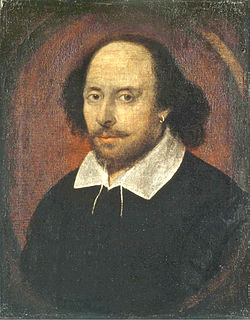


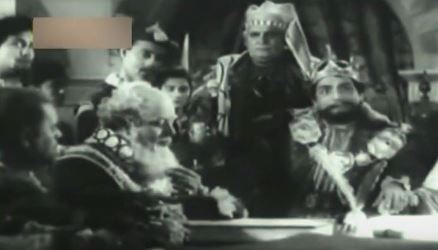
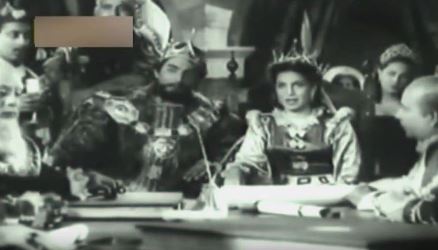
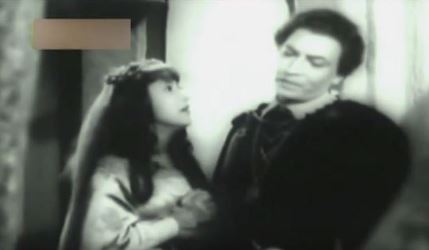


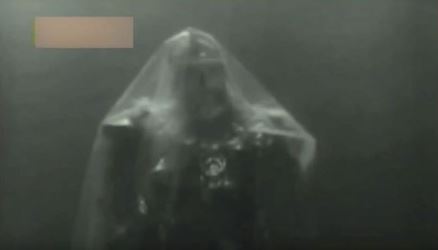


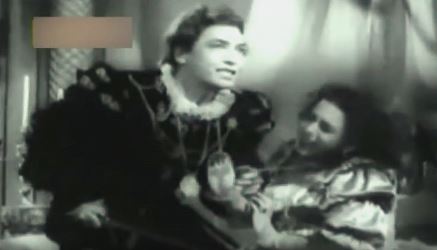

Great! So this was something ‘specific’ you were talking about.I was surprised to know that this 400 death anniversery of Shakespeare.His contribution for English Literature is unforgettable.Even after 400 years Shakespeare poems and plays are so famous that they are generally found in every Engish Book.’The Seven Ages’ is one of my favourite English poem ever.The story seems to be interesting .I would definitely want to watch this movie if it is available.Thank you so much to share this.
LikeLike
Yes, Kamini. This was the film I was talking about. I couldn’t not post something relevant to Shakespeare on this day – I doubt if there’s any other person who’s single-handedly done so much to enhance and enrich the English language. Just a list of the words he invented is impressive!
This version of Hamlet is available on Youtube:
LikeLike
Well, who would have thought! Indian stage has played Shakespeare often. So I think there was a good base for this film. I am glad Kishore Sahu thought of making this film.
Very good review, Madhu, and so so apt! May Shakespeare live forever!
LikeLike
Thank you, Ava! “May Shakespeare live forever!” And yes, amen to that. :-)
India and Indian theatre as well as cinema do have a love for Shakespeare. It’s interesting to see references to his works even in films that aren’t based on his plays. For instance, there’s a longish enactment of Othello in Humraaz, and Dharmendra and Tanuja also discuss Othello in one of their conversations in Izzat.
LikeLike
Oh yes! I forgot Hamraaz and the play. I haven’t seen Izzat.
LikeLike
Dharmendra has a double role in Izzat, with one character being the illegitimate son of an Adivasi woman (if I remember correctly) who is raped by a ‘bada aadmi‘. There’s a scene where the dark-skinned Dharmendra, who is in love with Tanuja, is trying to tell her that their love can come to nothing – and he gives, as an example, Othello. While the film isn’t great, I remember being impressed by that conversation, because they discuss the play in surprising depth.
LikeLiked by 1 person
Heh! The scriptwriter must have snuck it in.
LikeLike
Yes. Must have thought, “Let’s be different!” It was an unusually erudite conversation (from what I remember of it) for Hindi cinema.
LikeLiked by 1 person
i can relate to the sing song dialogue delivery after listening sohrab modi saheb. vividh bharti played his recording and he recited dialogues from one of shakespare play . the wonder is dialogues were total apt and last words were in rhythm like jfaai. shenshaai , yaad aayi. sohrab modi was the most buland avaaz of indian cinema. i liked kishore sahu in guide. will watch this movie. sohrab modi said he likes historical subjects as he likes to work on big canvass where there is more scope of every thing and he cannot do justice to social films like other directors do.
LikeLike
Not that this is Sohrab Modi, though…
Incidentally, compared to several actors in this film (especially Mala Sinha’s), Sohrab Modi’s usual style of dialogue delivery doesn’t come across as singsong at all. Probably because not too many of his dialogues were poetry – which isn’t the case with Hamlet. Here, since the dialogues are poetry, and a good bit of it in rhyme – as I mentioned – some of the actors succumb to the temptation of reciting their dialogues in rhyme.
LikeLike
This bit about a play that warns the villains that their crime is known was used in Karz as well. When Rishi Kapoor stages the song ‘Ik haseena thi’ to warn Simi that he knows how she disposed of her husband.
Shakespeare should have a tagline that says ‘Inspiring writers and filmmakers down the ages.’ Of course, unless some classicists come up with Greek ‘originals’ that inspired Shakespeare. :)
LikeLike
I agree with that tagline! So apt. You’re right about the classics that inspired Shakespeare, but I have a feeling that unless Shakespeare had made them such an intrinsic part of English literature by making them the bases of his plays, they probably wouldn’t have become half as famous. So perhaps a good deal of the credit does go to him, after all.
I’d forgotten all about that song sequence in Karz. I remember that as being one of the first films I fully understood (I had watched other films before that, but more often than not, understood only bits and pieces). I remember liking it a lot. :-)
LikeLike
Hadn’t even heard of this version of Hamlet, so this is indeed a revelation. Especially with the dialogues being closer to the spirit of the original than literal interpretations. Kishore Sahu is not one of my favourites – he usually looks like he’s impersonating a tree in a forest (an Oak, at that). But this sounds right up my street. Now, to see where I can find the film, and… WDIGTT?!
LikeLike
I hear you, Anu! I don’t like Kishore Sahu either – never have, though I suppose his acting as Marco (? was that his name?) in Guide was adequate enough. I suppose I watched Hamlet pretty much expecting to find him unbearable here, so the fact that he actually pulled off the role pretty well came as more of a surprise than anything else. There’s this particularly good scene, between Hamlet and the queen, where he’s trying to show her the difference between his father and her current husband (that’s the one I’ve taken a screenshot from in the post) – Kishore Sahu’s pretty good there. Elsewhere too, but that one stayed in my mind for a long while.
The film’s up on Youtube, just in case you do find the time. :-)
P.S.
“he usually looks like he’s impersonating a tree in a forest (an Oak, at that).”
I wish he’d made a version of Far From the Madding Crowd – and played the lead. ;-)
LikeLike
Thanks for the review, dear Madhu! A very good way to celebrate Shakespeare’s birth anniversary (despite the difference between Julian and Gregorian calendar). I got to know about the film, when I was preparing the post for Mala Sinha songs. Her mad-scene-song is a nice one.
Hamlet is good, but not really up my street. The play has very unsympathetic characters, which normally would liken it to me, but they are not even reasonably comphrensible, but on the other hand I like Shakespeare’s verses.
LikeLike
Thank you, Harvey! And yes, the Mala Sinha mad-scene-song is a good one. I do wonder if she sang it herself. After all, she used to sing for radio (and in the guest post Abhik Majumdar did for my blog, there was a song by her, if I remember correctly).
I agree, Hamlet isn’t my cup of tea either – if one were to go only by the story. I found the characters incomprehensible too the first couple of times I read the play (or watched the film – the Laurence Olivier one), but this time when I re-read it, it made more sense to me. Some motives are still a little dodgy, but I can understand it a bit better now. And the poetry, of course, is superb. Immortal, no less.
LikeLike
I think, the mad-scene-song, if aaja o mere pyare it is, is sung by Asha Bhosle.
LikeLike
No, that wasn’t the song I meant. The mad scene song I meant isn’t a ‘proper’ song, so to say: there’s no instrumentation to accompany the vocals, and the song is sung in snatches: one verse here, then some dialogue exchanged with somebody, then another verse, and so on. Na kisi ki aankh ka noor hoon is part of it.
LikeLike
It’s been a few years since I watched “Hamlet” but I remember being alternately amused and impressed by the film. It was initially a little disconcerting to see the play adapted so faithfully [Accepting Kishore Sahu as a Danish prince takes a bit of imagination on the viewer’s part :-)], but soon enough it was like a regular staging of the play – just in Urdu! I wouldn’t exactly say I enjoyed the film, but I certainly respected the effort.
LikeLike
‘disconcerting’ is the right word, Shalini – somehow, I’m so used to seeing even relatively well-made Hindi adaptations taking such liberties with the original, I had expected something drastically different from Hamlet. Barring the songs, everything of it really did put me in mind of the few times I’ve seen English versions of this play.
I wouldn’t say I ‘enjoyed’ it either – Hamlet (like some other Shakespearean tragedies) isn’t something I can ever enjoy, but yes, I did, like you, respect the obvious effort (down to engaging an Englishman – or so the name sounded – to act as consultant for costumes and set design).
LikeLike
I was wondering as to which Kishore Sahu’s movie got Madhu’s attention since you mentioned it in your last post. This is hardly what I was expecting. How on earth did you find it ? Very nicely written up, I might watch it one of these days. It would be first of anything nice from Mr. Sahu. We learnt something interesting from our guide in Rome that all we know about Marc Anthony, Julius Ceasar, the famous speech “friends, Romans and countrymen….” Is all from Shakespear who lived in England but wrote about Rome as if he belonged there. We take that as history and not fiction. There is some information about him living in Rome for a while but no proof !
LikeLike
Thank you, Neeru!
Yes, I thought this post might surprise a lot of people (in fact, I have a feeling – since most people come to my blog to read about Hindi cinema, not world cinema – that some, having read the first paragraph on the home page, have thought I’ve reviewed an English version of Hamlet and so have not bothered to read further). I came to know of this film several years ago, when I had a closer look at Mala Sinha’s filmography on IMDB, and noticed that she’d acted as Ophelia. I had searched for the film then, but hadn’t been able to find it anywhere. Then, a few months back, I noticed that it was on Youtube, and decided to give it a try (even though I didn’t have much hope – considering Kishore Sahu!). But it turned out far more impressive than I had thought it would be.
That’s an interesting tidbit about Shakespeare actually having lived in Rome – had never heard of it. But then, that’s what good writing is about, isn’t it? Of being able to evoke a time and place you may not have known at all. What’s impressive in Shakespeare’s case is that he did it all at a time when there was no Internet and no easy research. ;-)
LikeLike
Wow! Never knew there would be an Indian movie in this context! Also, I can imagine when you mention that as an Indian movie viewer, you never expect any movie to remain truthful to the original story, so it was great to see that Kishore Sahu kept true to the spirit of the original.. Songs I guess it may be too much to exclude!
Thanks for the review. I would have never known an Indian version of Hamlet existed..
LikeLike
Yes, it came as quite a surprise to me too when I first heard about it. And then, when I watched it and realized just how true it is to the original – that was even more surprising.
To be honest, I think two songs – the gravediggers’ song and the song Ophelia sings when she goes mad – actually do fit in well (though perhaps the gravediggers’ song could have had different lyrics, instead of being all about rain and clouds). The other songs could’ve been dispensed with.
By the way, there is another Hindi version of Hamlet, Vishal Bhardwaj’s Haider. I haven’t seen it yet, but plan to do so soon.
LikeLike
I recently got to knew about this movie and so happy that it has a beautiful review also. Senior hindi film writer and distributor J.P.Chokswey mentioned this movie when he wrote on Kishore Sahu ki aatm katha. it was written in last lines like .
Kishore sahu ney shakespare sey pray rit ho kar Hamlet ka nirmaan kiya. hamlet k prem mai uskey ang raksho k karan badha padti rehti hain. hamlet k drishy mai hamlet baney Kishore Sahu apney ang rakshako sey jhunjlakar puchtey hai ki voh unkey pass 24 ghantey kyu khadey rehtey hain. es par ang rakshak javaab dete hain ki voh unki suraksha k liye hain. es par hamlet kehta hai ki voh kyu na Kabar mein hi chlaa jaaye. goyaki puri hifaazat kabar mein hi hain. very less speakers, writers use Goyaki . chunachey is still used more.
Kishore Sahu auto biography has been published due to efforts of Chattisgharh CM and his Secretary. publishers Raj kamal prakashan. Kishore ji wrote his aatm Katha around 1975 and went to Rajender yadav ji for publication. but he wanted a grand publishing which was not possible so it was not printed. it was written in article that he developed differences with kamal saheb after directing dil apna aur preet paraayi. what i knew about him is that he had life long friendship with Mahesh Kaul and Amrit lal Nagar ji. amrit ji also worked in his few movies. i wished more success for his son vicky sahu. i am going to celebrate big kishore sahu film festival at home before reading his Aatm katha. i really wish to know about him and his idea of cinema.
LikeLike
“Kishore Sahu auto biography has been published due to efforts of Chattisgharh CM”
Hadn’t known that.
LikeLike
This objective assessment of the unusual movie which is not an Indianized adaptation but an as it is portrayal of the immortal work of Shakespeare, has aroused curiosity in me to watch this movie ASAP. It’s available on internet (must be an abridged version). I am an admirer of Kishore Sahu who, in my view, was a filmmaker who knew his job well.
LikeLike
I’d be eager to know your take on the film once you’ve seen it. I was very intrigued by it, because what I’d expected was an Indianized version of the play, but what I got was so unusual. I too watched it online (on Youtube, if I remember correctly) and that did seem complete, not abridged.
LikeLiked by 1 person
Watched this movie today and am sincerely thankful to you for recommending it to me. Though it has been made in the manner of a Persian theatre play and not as a regular feature film, the honesty of the filmmaker for being true to the original Shakespearean work is laudable. It’s not according to the taste of the Indian audience (must have been commercially unsuccessful) but it’s overall a good movie which should be watched by those who are willing to seek a crash course for understanding the classic piece of literature called ‘Hamlet’.
LikeLike
Sorry for this delayed reply. I read your comment in my mail and had intended to reply here, but completely forgot.
I’m glad you enjoyed this film – I thought too that it was a good one, and even though it would most likely have been a flop, it is an admirable piece of work, evoking the original very well.
LikeLiked by 1 person
Hi madhu ji ! After reading kishore sahu autobiography Meri aatm katha. I wish to write what he has written on hamlet.
Kishor sahu first saw hamlet in Nagpur performed by b.a.benjamin for aarya subodh company. He liked the play a lott and by watching Benjamin performing hamlet . He was impressed and was determined to become actor n play hamlet . Kishore sahu ji was 14 . Aarya subodh company was owned by sohrab Modi ji. Kishore sahu father became friends with both. B.A. Benjamin was relative of actor David Abraham.
Few years later sohrab Modi himself used to perform as hamlet. Kishore sahu again saw the play but he liked Benjamin acting only.
Around mid 1952 he decided to make hamlet and for hamlet costumes he even travelled to Europe . He attended Venice flim festival in 1952.
Sahu ji said flim was released on 7 Jan 1954 aur chitra sadharan raha. He said at those times people could not even say hamlet properly and used to say omlette. Audience did not like the plot n dramatic acting. audience failed to understand pure urdu dialogues.
But he was happy that actress Sybil thorndike and her husband Lewis casson liked the movie a lott. The couple was understood to be authority on Shakespeare dramas. They were in India that time. Sahu invited them to watch movie in metro cinema.
Sybil ji said although I don’t know Urdu but I understood Every dialogue and scene. She said she like his version more than Lawrence Oliver version. Lewis also said the same. Kishore sahu was very happy and content to get the praise.
LikeLiked by 1 person
What an interesting anecdote! Thank you for that.
LikeLike
Hi madhu ji ! After reading kishore sahu aatm katha. I wish to say the book ís nicely written. Kishore sahu had vast experiences of life and he is able to write it properly for readers in intresting way. His writing has flow.
My own understanding of Kishore sahu ji is not different from what writer Rajender yadav ji said that kishore sahu behaviour had certain aristocracy.
After reading his aatm katha. Sahu ji definitely had certain kind of pride of being educated, Sophisticated and being an enlightened soul.
After seeing his happy family pics in book. I felt very sad as his children had difficult life. One fan said kishore sahu ran into problems while making pushpanjali with Prem nath which broke him financially and as person.
Overall a nice read. Kishore sahu ji definitely lived an extraordinary life. Ajeeb dasta hai yeh . Kaha shuru kaha khtam. Yeh manziley hai kaun si. Na voh samjh sakey na hum.
LikeLiked by 1 person